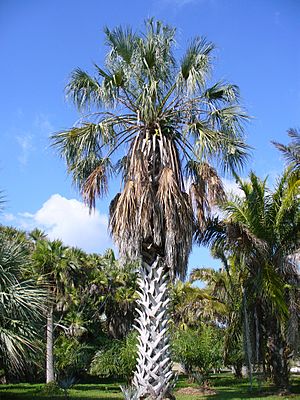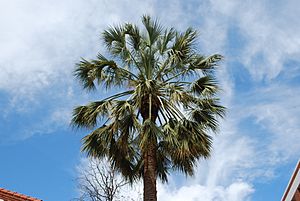Sonoran palmetto facts for kids
Quick facts for kids Sonoran palmetto |
|
|---|---|
 |
|
| Conservation status | |
| Scientific classification |
|
| Kingdom: | Plantae |
| Clade: | Tracheophytes |
| Clade: | Angiosperms |
| Clade: | Monocots |
| Clade: | Commelinids |
| Order: | Arecales |
| Family: | Arecaceae |
| Genus: | Sabal |
| Species: |
S. uresana
|
| Binomial name | |
| Sabal uresana Trel., 1900
|
|
| Script error: The function "autoWithCaption" does not exist. | |
Script error: No such module "Check for conflicting parameters".
The Sonoran palmetto, also known as Sabal uresana, is a type of palm tree. It grows naturally in the foothills of the Sierra Madre Occidental mountains in northwestern Mexico. You can find it in the states of Chihuahua and Sonora. The second part of its scientific name, "uresana", comes from Ures, a town in Sonora where this palm tree grows. Sadly, the Sonoran palmetto is currently at risk because its natural home is disappearing.

Contents
About the Sonoran Palmetto
The Sonoran palmetto is a beautiful and strong palm tree. It can grow quite tall, reaching heights of up to 20 meters (about 65 feet). Its trunk is usually thick and covered with old leaf bases, giving it a rugged look. The leaves are large and fan-shaped, a common feature of many palm trees.
Where Does It Grow?
This palm tree loves the warm, dry climate of northwestern Mexico. It grows in the lower parts of the Sierra Madre Occidental mountain range. This area has a mix of dry forests and grasslands. It is a special place for many unique plants and animals. The Sonoran palmetto is an important part of this ecosystem.
Why Is It Important?
The Sonoran palmetto provides food and shelter for various animals. Its fruits are eaten by birds and other wildlife. The palm's leaves can also be used by local people for crafts or building materials. It is a valuable part of the natural environment.
What Does "Vulnerable" Mean?
The Sonoran palmetto is listed as "Vulnerable" by the IUCN. This means it faces a high risk of becoming extinct in the wild. The main reason for this is habitat loss. Habitat loss happens when the places where plants and animals live are destroyed or changed. This can be due to farming, building, or other human activities. Protecting these areas helps save the Sonoran palmetto and other species.
See also
 In Spanish: Sabal uresana para niños
In Spanish: Sabal uresana para niños
 | John T. Biggers |
 | Thomas Blackshear |
 | Mark Bradford |
 | Beverly Buchanan |


